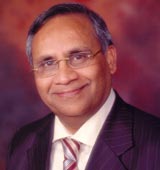|
Executive Interviews: Interview with Anil K Khandelwal on Rebranding Strategies of Bank of Baroda
June 2006
-
By Dr. Nagendra V Chowdary
Was it in recognition of customer need or
was it proactive?
It was a proactive step. I always believed
that banking services are built in India around
the employee convenience, not on customer
convenience. We opened banks not on
Sundays because it was not convenient to
employees. We carried banking half day on
Saturday because it was not convenient to
employees. We carried banking 10 to 5
because it was not convenient to us. I was
always feeling very sensitive that there are
hundreds and thousands of customers that it
is convenient to do banking to themin the early
morning and in the evening.
|
|
It was out of that
empathy for customers. I always believe that
I am giving customers service in one place. I
am a recipient of customer service in 99 other
places and therefore I have always believed
that 21st century belongs to customers and
this is a small token of recognition of that, that
we've introduced 8 am to 8 pm banking. How do you rate Bank of Baroda on
responsibility as a critical success factor?
We are a responsible bank and as I said
all these factors we are building because we
are a large geographically dispersed
organization and therefore these aspects are
to be continuously nurtured and built across
the organization. But we are, I can say with
some confidence, a fairly responsible
organization. In hindsight,what has been themajor lesson
from this entire transformation or change
management in this re-branding exercise?
I always believed and it is reinforced by
this branding exercise that reach out to people,
put the people first, make demands on them.
I have always believed that high ambition
means high achievement, low ambitionmeans
low achievement and no ambition means no
achievement. When you explain to people
your vision, you reach out to them, you trust
them, and the performance is always far
better. Sometimes your employees can
surprise you, like our branding team surprised
me by delivering on time. In the process of somebody being very
ambitious, he really wants to do well, what if
he fails?
Well that's a risk that every one of us
takes. So what is the risk factor that the bank can
absorb?
This is where your planning helps. I
always believe in order to be successful,
success is to be planned in every step,
otherwise unconsciously we plan for failure.
We very consciously planned for the success
as to when the brand is being launched, what
activities we can do simultaneously, what
further customer initiatives we can take. We
were constantly planning, every single day we
were monitoring. If you could've simply given
a decision and forgotten about it and don't
support our people in times of crisis and don't
look around, I think we would have not been
successful. So I think success is to be planned.
Success is not merely a statement of ambition. As you reflect very powerfully on the entire
change management, I am sure, you may
have one or two powerful lessons that can be
shared with rest of the public sector banks or
other banks.
One is that we should come out of this
mindset that in public sector it is very difficult
to change things. One lesson all of us can
learn is that public sector requires more
changes than any other sector. Procrastination
of change leads to the death of organizations
today and therefore it is up to the leaders to
change the status quo and be transparent, set
the vision, share the vision, own the
responsibility. I have found that much of the
things in public sector like problems by
employees, problems by unions, problems by
government, regulator, are over exaggerated.
Public sector being public sector, they are
more transparent. People ask you questions.
As long as you reply to those questions and
don't feel offended, I think it is very easy to
implement that. That is what has happened in
our re-branding exercise. We've also been
questioned by many "Are we over
expanding?" "Are we playing with public
funds?" "Why have we taken Rahul Dravid?"
"Why are we doing all these things?"We have
been very transparent and I think it has given
us quite a good satisfaction undertaking this
exercise. Maybe because in this case it was more of
personal you've driven this entire exercise
because of your leadership but it might call
for more efforts for some other institution,
which is process driven, to get into the change
mode.
I would say that leaders have to be
process driven. Processes are important.
Perhaps you meant systems driven, not
process driven because the processes are
key processes of reaching out to people,
processes of motivation, processes of
understanding problems, processes of
problem solving. Good leadership is a key.
Leaders have to be grounded in reality. They
may have a ninth cloud vision but their feet
should be on ground. That's what makes all
the difference. Can you tell us one good reasonwhy people
should bank with Bank of Baroda?
I would say that we are trying to create a
bank that understands customers. Once you
understand customers, you understand their
needs, mind and problems. Accordingly, you
design the products and channels, and a bank
like that can create all the difference.
1.
Rebranding Strategies Case Study
2. ICMR
Case Collection
3.
Case Study Volumes
|
The Interview was conducted by Dr. Nagendra V Chowdary, Consulting Editor, Global CEO and Dean, IBSCDC, Hyderabad. This Interview was originally published in Global CEO, IUP, June 2006. Copyright © June 2006, IBSCDC
No part of this publication may be copied, reproduced or distributed, stored in a retrieval
system, used in a spreadsheet, or transmitted in any form or medium electronic,
mechanical, photocopying, recording, or otherwise without the permission of IBSCDC. |
